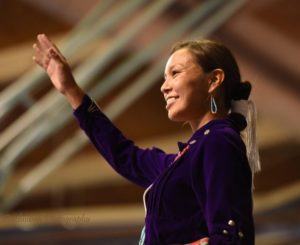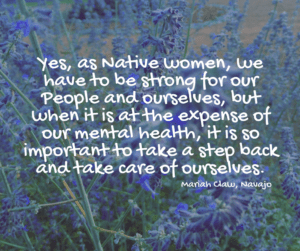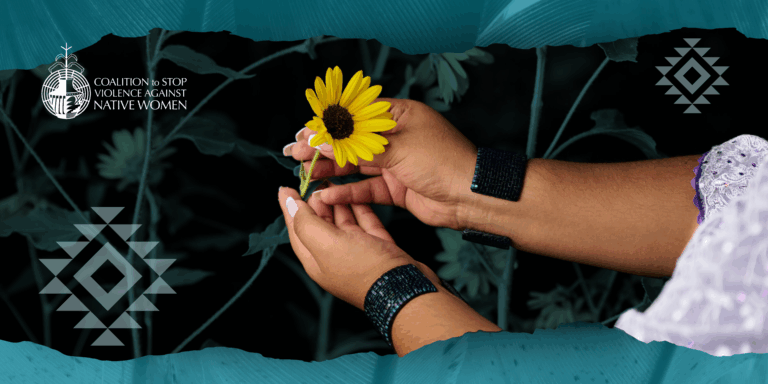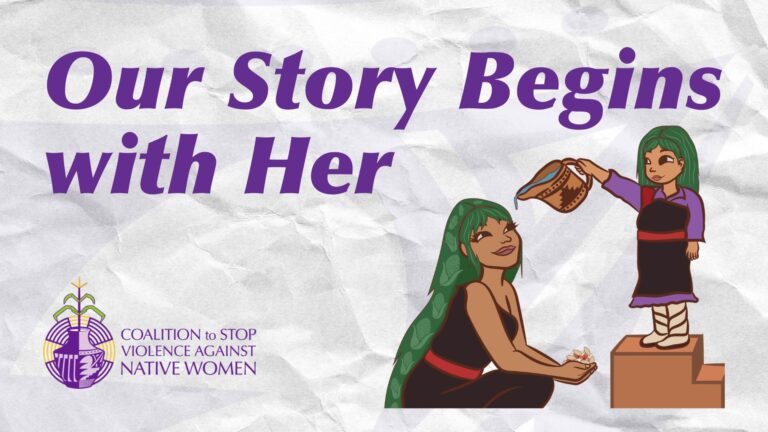 Finding My Happy By Mariah Claw (Navajo Nation)
Finding My Happy By Mariah Claw (Navajo Nation)
You know how people always ask you what you want to be when you grow up or where you hope to be in five or ten years? Well, my answer has changed over and over again. But, I think I have finally decided on what I want to be when I grow up. I want to be happy.
I was born and raised in Chinle, AZ, the heart of the Navajo Nation. My favorite memories are of my brothers and sisters and I playing in the dirt without shoes or a real care in the world. All we knew was that Super Smash Bros. reigned supreme and our weekends were filled with basketball games. Naturally, as we grew older, our interests changed and we took up different hobbies.
As a teenager, I never really represented a specific niche. I will admit that fitting in at school was something I always wanted but never really had. I was the captain for our volleyball and softball teams – jock. I was a major grade grub and graduated from Chinle High School as valedictorian – nerd. But, I was also stubborn and resistant to authority in my own way – troublemaker. Despite my constant transition from one type of kid to another, I did not feel like I had many friends-for-life friends. Luckily, college happened.
I played softball for a year at Dartmouth College. I joined a sorority sophomore fall. I studied abroad in New Zealand for three months. I went on  adventures with friends in New York City and Boston. I finally began to form relationships with people who were interested in the same things as me and were also not confined to one label or another. It might sound like the corniest thing you have ever heard but my college years were certainly the most incredible years of my life. I met brilliant people who are now my very best friends. I met people who I fell in love with and who eventually broke my heart. And I met people who still inspire and motivate me every day to be great. No one can really ever tell you how to prepare for the whirlwind that is your undergraduate career. But, there are always people who care about you and who will do what they can to help you through even the worst of times.
adventures with friends in New York City and Boston. I finally began to form relationships with people who were interested in the same things as me and were also not confined to one label or another. It might sound like the corniest thing you have ever heard but my college years were certainly the most incredible years of my life. I met brilliant people who are now my very best friends. I met people who I fell in love with and who eventually broke my heart. And I met people who still inspire and motivate me every day to be great. No one can really ever tell you how to prepare for the whirlwind that is your undergraduate career. But, there are always people who care about you and who will do what they can to help you through even the worst of times.
Having said that, I feel like it is also important that I share the other part of my college experience. I constantly battled anxiety, depression, and homesickness. I almost never talked about my mental health with anyone because (1) I was always afraid that they would dismiss me, using my attendance at Dartmouth against me. “How can you feel like that when you are attending one of the best schools in the country on scholarships? Do you have any idea how lucky you are?” That kind of thing. And (2) I suffered from the “strong woman” trope. I refused to show weakness because Native women are constantly dragged to hell and back and we are supposed to be “tough.” In hindsight, I should have asked for help. Yes, as Native women, we have to be strong for our People and ourselves, but when it is at the expense of our mental health, it is so important to take a step back and take care of ourselves.
On June 14, 2015, I was presented with my Bachelor’s degree from Dartmouth College. I remember getting up at 4:00 a.m. with my mom and grandma so that I had enough time to perfectly wrap my kéntsaa, match my jewelry, and tie my tsiiyeeł tight. Walking across the stage was one of the most empowering things that I have ever experienced. And in those few seconds where all eyes were on me, I could not help but think about how easily I could have fallen victim to alcohol, drug, and domestic abuse. I thought about how I escaped the cycle of pain and struggle. And then I thought the struggles I had experienced and how I might contribute to restoring hózhó on the Navajo Nation.
In my most recent adventure, I ran for the coveted title of Miss Navajo Nation. While I did not win, I can say that my experience was far from fruitless. I gained seven beautiful sisters. I proved that we are capable of walking in two worlds, having entered the competition as an elementary-level student of Dine bizaad. And I was able to shed light on social issues that are often swept under the rug – abuse of Indigenous women and children, exploitation of Mother Earth and Father Sky, ever-present expressions of racism, and corruption of our own tribal government. My hope was that even if the crown were not placed on my head, my passions and experiences would empower and inspire our People. I believe I accomplished what I had set out to do and so I consider my campaign a successful one.
What I have shared with you barely scratches the surface of my journey, but I hope that in reading about my triumphs and my struggles, you find strength in knowing that things do get better. Hózhó is often interpreted to mean balance and harmony in the English language. As Diné, we recognize that we exist alongside all things in this life – living and nonliving. And, to live in hózhó, we accept the good and the bad that exists in the world. We need not live in a constant state of all-consuming fear. We do not need to always fight under the command of our anger and resentment. We can be warriors motivated by a love of our land, our bodies, and our spirits. And nothing makes me happier than doing whatever I can to help restore hózhó in Diné bikéyah. Ahéhee’. — Mariah Nicole Claw, Totsohnii | Todich’ii’nii | Dibé Łizhiní | Ma’ii Deeshgiizhnii
Related Posts

Breaking the Silence: Confronting Sexual Violence in Indian Country
Native American communities face a crisis that demands urgent attention: sexual violence rates in Indian…

Uplifting Our Social Workers: Honoring Hope, Healing, and Advocacy
As Spring arrives, bringing renewal, growth, and fresh beginnings, we pause to reflect on the…

Our Story Begins with Her
This Women’s History Month, we are honoring the strength, resilience, and wisdom of the matriarchs…
